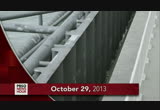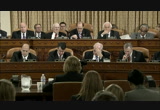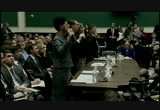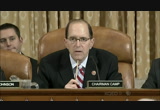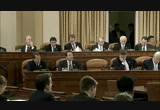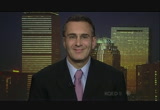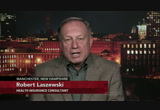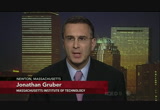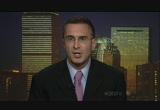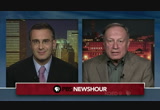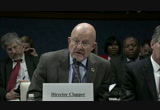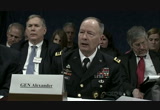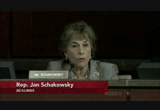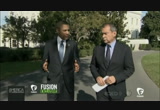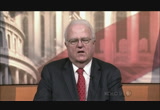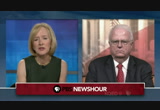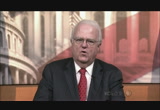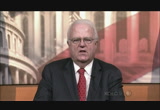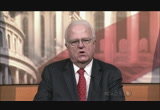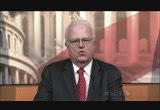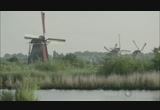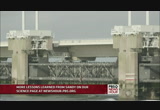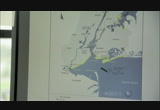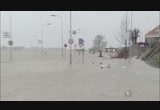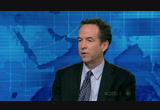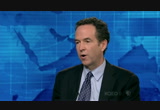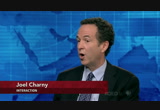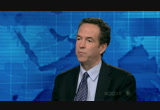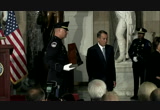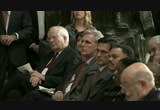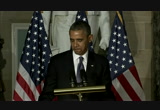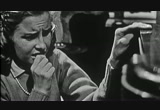tv PBS News Hour KQED October 29, 2013 3:00pm-4:01pm PDT
3:00 pm
captioning sponsored by macneil/lehrer productions >> i want to apologize to you that the web site has not worked as well as it should. >> ifill: under grilling by a house committee, a top government official concedes the problems plaguing healthcare.gov have crippled its launch. good evening. i'm gwen ifill. >> woodruff: and i'm judy woodruff. also ahead this tuesday, top intelligence officials before a separate house panel faced a barrage of questions about n.s.a. surveillance of u.s. allies. >> ifill: and one year after superstorm sandy, what american cities can learn from the netherlands, as they prepare for the next big storm. >> test test test for newshour. testing testing. >> you are quite surprised to see a city like new york, so
3:01 pm
many people expose and no levees and no protection at all, that was astonishing to me. >> ifill: those are just some of the stories we're covering on tonight's pbs newshour. >> major funding for the pbs newshour has been provided by: moving our economy for 160 years. bnsf, the engine that connects us. >> united healthcare-- online at uhc.com. >> the william and flora hewlett foundation, working to solve social and environmental problems at home and around the world. >> and with the ongoing support of these institutions and
3:02 pm
foundations. and... >> this program was made possible by the corporation for public broadcasting. and by contributions to your pbs station from viewers like you. thank you. >> woodruff: members of congress took fresh aim at the new health care law today. the house ways and means committee called in the head of the centers for medicare and medicaid services, who accepted responsibility for some of the problems with the health care web site. newshour congressional correspondent kwame holman begins our coverage. >> to the millions of americans who have attempted to use let thot shop sand enroll in health care coverage, i want to apologize to you that the web sipt has not worked as well as it should. >> reporter: at the outset, health program administrateor marilyn tavier acknowledged the problems with the web site that launched october 1.
3:03 pm
but she ran into skeptics over the administration's new timeline to fix the computer access roadblocks by the end of november. >> you've had nearly four years to get it ready, now you're saying in four weeks more it will be great. so what's different? why should anyone believe these claims? >> because i think we have identified two major problems: one had to do with the initial volume and despite our best volume projections, we underestimated the volume, the interest in the site. the second thing is we have found some what i will call functional or glitches as we call them the public term for the actual application itself which we're repairing. >> reporter: outside contractors have said tavenner's agency curtailed testing of a site meant to enroll millions of uninsured americans in 36 states. >> do you have an idea of how many applicants became enrollees.
3:04 pm
>> reporter: today tavenner said 700,000 have applied, she declined to say how many enrolled. >> we won't have that until mid-november. we have people shopping now. we expect the initial number to be small and i think you've seen this in hour projections. >> reporter: committee republicans also challenged tavenner on other aspects of the affordable care act beyond the technical problems of the healthcare.gov web site. among them: whether president obama has broken his promise that americans would be able to keep their existing health plans if they wanted them. ways and means committee chairman dave camp bore in on that point. >> this man wrote he and said "my wife has been recently informed by her insurance carrier that her health care policy does not comply with the affordable care act. now we must purchase a new policy to get the same coverage at an 18% increase in our premium. so what happened to the "if you like your insurance you can keep it" question? >> now if, in fact, the issuer has decided to change the plan, didn't have to, but plans were grandfathered in in 2010 and if
3:05 pm
they offer new plans they have to come in to the requirements of the affordable care act. so what i wouldel that individual is if their carrier is telling them they're changing the plan and they're offering an increase, that they would need to go take a look at what's available in their state and in their market which is certainly something that's available to them through the exchange. >> reporter: democrats have joined in criticizing the health plan cancellations and online malfunctions. but they also voiced frustration with republicans today as in this exchange. >> let's not water wine here. let's say it like it is: you refuse to expand many of these governors' medicaid, they refuse to set up state marketplaces to -- leaving millions of dollars in outreach on the table in education funding, what are you gonna do about the approximately 17 million children wpl pre-existing conditions who can no longer be denied health insurance coverage? >> it's a false choice to say
3:06 pm
it's obamacare or nothing. there are numerous proposals, including the one i'm a co-sponsor of. >> are you serious, what you just said? are you really serious? >> we've gone through 44 votes-- 48 votes now-- of you trying to dismantle this legislation. you call that cooperation? i don't! >> reporter: next up, tavenner's boss health and human services secretary kathleen sebelius. she appears tomorrow before the house energy and commerce committee. rough >> woodruff: we'll talk about the growing complaints that existing insurance policies are being canceled, right after the news summary. lawmakers from both parties called today for barring the sweeping surveillance of phone calls and e-mails. but the chair of the house intelligence committee warned it would hurt the hunt for terrorists. meanwhile, white house officials said president obama is considering ending eavesdropping on allied leaders. more on all of this, later in the program. hard-hit areas of new york and new jersey marked one year today, since hurricane sandy wreaked havoc along the
3:07 pm
northeastern u.s. coastline. the storm was blamed for 181 deaths and $65 billion in damage across more than a dozen states. seaside heights, new jersey, is one of the beach towns that remains heavily damaged. and many who are rebuilding say they're concerned about getting affordable flood insurance. >> fema said the government with all these associations that say they want to help you but in the end you don't qualify for anything. >> we don't even know to be honest whether we'll be able to afford to keep our house once we're in it. >> woodruff: in washington, a bipartisan group of lawmakers introduced a bill today to delay changes to the federal flood insurance program that would make it more expensive. the winter olympics in russia begin in 100 days, and now there's word that illegal dumping could taint the water supply for the games. the associated press reported today that contractors are burying construction waste at an illegal landfill outside sochi.
3:08 pm
the site lies in a water protection zone. the russian government promised a "zero waste" effort as part of its winning olympic bid. police in china said today that a car crash in beijing's forbidden city was likely a deliberate act. they said the people in the car apparently set themselves on fire. we have a report narrated by john sparks of independent television news. >> reporter: normality returned to tiananmen square today. the clouds came back and the police did their checks and it all seemed calm orderly. as for yesterday's events, there wasn't anything to see. it's impossible to deny what happened, however. a 4 x 4 burst into flames after it was driven at speeds through a pedestrian thoroughfare packed with tourists. five people were killed and 38 injured.
3:09 pm
state media acknowledged the incident late last night but the presenter had few details to offer. police sources have reportedly described the incident as a suicide attack and they've begun circulating this leaflet to local hotels asking for information about men in vehicle from a region in western china. it's home to the muslim uighurs and many members of this ethnic group complain of cultural and religious repression. frustration has turned to violence, rioting there in 2009 cost the lives of 200 and this summer saw a large number of violent incidents. the police stepped up security in and around the capital today on the lookout for future attacks. such incidents are rare in beijing but they serve as a reminder of instability and
3:10 pm
vulnerability at the world's most populous state. >> woodruff: in syria, the world health organization has now confirmed ten cases of polio in the northeast, and it's warning the disease could spread across the region. the w.h.o. also urged the syrian government and rebels to allow access to some 500,000 children who need to be immunized. we'll have more on this story a little later. the first underwater rail link between europe and asia was opened today in turkey. the eight-mile tunnel runs beneath the strait of bosphorus, connecting the european and asian sides of istanbul. construction began in 2004, and cost almost $3 billion. it's one of prime minister tayyip erdogan's "mega projects," designed to modernize turkey. other projects include a massive canal and the world's busiest airport. the u.s. bailout of general motors will end up costing taxpayers just under $10
3:11 pm
billion. the inspector general for the bailout program reported the it today. the effort initially cost $50 but the treasury has recouped much of that by selling its stake in g.m. wall street racked up new gains on optimism that the federal reserve will continue its stimulus efforts. in anticipation of its decisions, the dow jones industrial average gained 111 points to close at 15,680, an all-time high. the nasdaq rose 12 points to close at 3952. the s&p finished at a record close near 1772. still ahead on the newshour, why thousands of insurance plans have been canceled as a result of the health reform law; top intelligence officials defend the scope of u.s. spying; what the dutch can teach us about preparing for extreme weather; polio adds to the humanitarian crisis in syria; and poet billy collins on his latest book.
3:12 pm
>> ifill: hundreds of thousands of americans have been surprised in recent weeks with cancellation notices from their health insurance companies. many of them are unhappy at being forced back into the health care marketplace even as the federal government struggles to get the affordable care act up and running. why the change? and does it constitute a broken presidential promise? for that, we turn to jonathan gruber, a health economist at m.i.t. who's considered one of the many architects of the affordable care act. and robert lazewski, a consultant to the health insurance industry. welcome to you, gentlemen. okay, i have to start with you, jonathan gruber, since you are one of the architects of the affordable care act. did the president make a promise he couldn't keep? >> you know, i don't want to get into the president's word choice but the president said is people can keep the insurance they like he probably should have said people can keep the quality
3:13 pm
insurance that they like. there's a lot of insurance throughout that isn't quality insurance that are has various limitations with it. but the key thing to remember is that this is not an issue for the vast majority of americans. the vast majority of americans have health insurance from their employer or government and that's not touched. this is an issue for the substantial minority, maybe 5% or 6% of americans, that buy insurance on their own. about half of that population will probably have to buy up because of this law. their policies are getting changed. others their policies are getting canceled but they can buy things that are substantively similar. >> ifill: robert lazewski, what about that? was this at the very least an oversimplification? >> well, you're looking at one of the people who the promise wasn't kept for. i have an individual health insurance policy. i received my cancellation letter a few weeks ago. it wasn't a junk policy. i think one of the things i hear that obama administration say we've got all these substan start policies. that just isn't the case. i had a gold-plated health insurance plan. i could go to any doctor or hospital in the united states
3:14 pm
virtually. i could go to mayo clinic, the cleveland clinic. i've been in the health insurance business for 40 years. i had a cadillac plan. my health insurance company sent me a cancellation notice, told me i could go look at other plans for january. the best plan i can find personally is another blue cross plan, i'm happy to stay in that network. but it's got a much narrower network, hundreds of thousands of providers less, the deductble is $500 higher and the rate increase is 56% more. i spoke a good friend in fresno who told me his grand daughter is getting a 43% increase and she's got a terrific plan. >> ifill: let's distinguish between -- >> this is a small percentage of people, that just isn't the case. >> ifill: let's distinguish between anecdotes and the larger question, mr. lazewski, which is how much of this is -- when you're talking about people like you in the individual market as opposed to people who get their insurance-- most people-- from their employers or medicare and medicaid? >> according to the association
3:15 pm
of health insurance plans, there are 19 million people in the individual health insurance market. the vast majority of them are not going to be so-called grandfathered and keep their plans. if you bought your plan since march of 2010 it is not grandfathered. you're not gonna be able to keep it. if you have a plan in force between march of 2010, the only way you can keep it is if you made almost no change to it. phenomenon the individual health insurance market, it's very common for people to increase their deductibles in order to avoid rate increases. my estimate is something like 80% of the people in the individual health insurance market between now and december 2014 won't be able to keep the plan they're in. >> ifill: you put a lot out there. let me give mr. grub err chance to respond to that. >> sure, and this is a matter of degrees. i agree with mr. lazewski that some people won't keep their plan. let me point out a couple facts. the 19 million number is wrong. that's with people for a supplement to the group insurance, not their primary
3:16 pm
insurance. the number of americans from individual insurance to primary insurance 12 million. big number but smaller. remember, gwen, less than 10% of the share of people that get insurance from their employer. so we're talking about a substantial minority of the population. >> ifill: and yet -- >> the president made a promise and 12 million people are going to have to -- >> ifill: mr. lazewski, let me finish this up. in pittsburgh they sent out cancellation notices to 20%, mr. gruber. in florida, florida blue cross sent them out to 80% of their members. in philadelphia to 45%. that may seem small but it sounds like big chunks of the individual market are being carved up here. >> absolutely, gwen. the first thing i want to point out is it f.i.s. individual market. second point, this is a market with huge turnover anyway. only 17% of this market stay in this market for more than two years. this market turns over a lot anyway. third, that's right, there are some people -- the president definitely generalalized. some people won't be able to
3:17 pm
keep their policies but most people losing policies -- not most people, about half the people losing policies will be able to buy insurance comparable to what they had. about half won't. >> ifill: but what happens if you lose your -- you get your cancellation notice today and you want to go online to get the new insurance but you can't because of the problems are w the system, with the web site, and you are not covered in january or whatever this kicks in? >> i completely agree that a's a problem with the web site not working by the end of november. it's nice to be able to shop today but you need to be signed up by mid-december. >> this is a huge issue and i would just -- >> mr. lazewski, go ahead. >> to just help your audience, any people who have gotten the cancellation letters, i renewed my policy by calling my insurance company directly and going around the site. the bad news is i wasn't able to shop because i went to one carrier and the other thing is if i need subsidies i can't get a subsidy from my carrier because they can't get into the
3:18 pm
subsidy system either. that is a fallback temporarily. i would encourage people call their incumbent carrier and get the best situation they can so they don't have a lapse in coverage. >> ifill: that's a temporary fix mr. lazewski. go ahead, mr. gruber. >> that's the only fix there is, gwen. healthcare.gov doesn't work. >> ifill: mr. gruber? >> the point is it doesn't have to work yet. i'm not saying it's not a shame, it's a problem, i wish it worked but we're panicking over a short-run problem. it doesn't have to work yet. it these work by the end of november or mid-december so people can sign up. >> oh, my goodness -- healthcare.gov has been three years in coming and they've got fix it in five weeks. they've got to clean up a mess that took three years and i don't know that we panic but there's reason for great concern here. >> ifill: you don't think there's a fix, mr. lazewski, what do you think mr. gruber? >> i think neither lazewski nor
3:19 pm
i can talk about the tasks in the next couple weeks. the government said they'd have it up and running. if they don't the issues mr. lazewski are real ones and the government has to figure out how to help those whose policies are canceled. let's not panic yet. if it's not ready in five weeks we need to raise these issues. >> ifill: bob lazewski, a health industry consultant and jonathan gruber of m.i.t., thank you very much. >> my pleasure. >> thank you, gwen. >> woodruff: the criticism over u.s. surveillance programs at home and abroad continued this afternoon at a house intelligence committee hearing. but the directors of national intelligence and the national security agency pushed back. >> one of the first things i learned in intel school in 1963 is that this is the fundamental giveen in the intelligence. >> woodruff: that fundamental
3:20 pm
according to director of national intelligence james clapper, is learning the intentions of foreign leaders, even if it means spying on allies. what's more, he told today's house hearing it's a two-way street. >> do you believe that the allies have conducted or at any time any type of espionage activity against the united states of america, our intelligence services, our leaders or otherwise? >> absolutely. >> there have been disclosures in recent days that the national security agency eavesdroped on german chancellor angela merkel. the n.s.a.'s director, army general keith al sander the, defended the general practice of surveillance in the u.s. and abroad to prevent terrorist attacks. >> there has not been a mass casualty here in the u.s. since 2001. that's not by luck! they didn't stop hating us. they didn't say that they were going to just forgive this. they continue to try.
3:21 pm
it is the great members in the intelligence community, our military, our law enforcement that has stood up and said this is our job and we do it without w our partners and allies. >> reporter:. >> woodruff: house intelligence committee chairman mike rogers also defended the efforts. >> the way we go forsword to make sure our programs are protected and by people who are doing their best not be demonized in the process. this is the time for leadership? a very dangerous and chaotic world. it's not a time to apologize. >> woodruff: on the other hand, democrat jan schakowsky of illinois underscored concerns by some that the surveillance has gone too far. >> why did we not know that heads of state were being the eavesdroped on? spied on. the reason why it's important is because it is a policy issue
3:22 pm
that has very broad implications. it could put the united states in a difficult position. >> woodruff: yesterday dianne feinstein expressed outrage over spying on friendly foreign leaders. she says white house officials assured her it's going to end. the white house said only that a review is underway. for his part, the president declined to address reports that he did not learn of the practice until last summer. instead, he told the fusion news channel -- >> well, first of all, i'm not confirming a bunch of assumptions that have been made in the press. there are strict law about what we do internally and that was the initial concern about the snoend disclosures. internationally, there are less constraints on how our intelligence teams operate. >> woodruff: meanwhile, a bipartisan group of lawmakers called today for an end to most
3:23 pm
of the n.s.a.'s surveillance with phone records and e-mails. one of those lawmakers calling for limits to spying is wisconsin republican jim sensenbrenner chairman of the house crime and terrorism subcommittee. chairman sensenbrenner, thank you very much for being with us. can you explain to us what's the main change you want to make in the ability of these surveillance agencies to do their work and why have you changed your mind about how much latitude they should have? >> well, i think that they've gone much further than the patriot act ever intended them to do. the patriot act was passed to say the intelligence agency should target a non-u.s. person who was in an authorized terrorist investigation and then collect intelligence on who he was in contact with and what he might be up to. what the n.s.a. has done over the last six to eight years is they've grabbed everybody's phone records and tried to match
3:24 pm
that to see who might be involved in the terrorist strike. the n.s.a. has not ever come up with how many the terrorist conspiracys that they've actually been able to solve in doing this and, you know, i can say that two teenagers talking about who they're taking to the prom is not going to lead to somebody who wants to blow up chicago. it goes much too far. it brings in people who are innocent and not involved in any type of criminal or terrorist activity and i think the time has come to stop it because it's an invasion of privacy. >> woodruff: i'm sure as you know they are collecting what they call metadata. the fact that phone calls took place, the phone numbers, the duration of the call, the accumulation of e-mails but they say they're not listening and reading unless they have a reason to do so. >> well, so what? the fact that the calls took place and they get trillions of
3:25 pm
these calls makes the haystack so big they can't find the needle in it. and even though sashg brothers in the u.s. legally, when the russians told us they were bad guys they weren't able to track down who they were zeroing in on before the boston marathon bombing. look there has to be a balance between privacy and security the n.s.a. and their supporters in the congress have said let's forget about privacy and civil liberties, let's forget about the first and forth amendments. i can't do that because i think what's made america a different country is our respect for these types of issues and certainly what the n.s.a. has been doing is a lack of oversight and it's destroyed trust with our allies, particularly those in europe! >> woodruff: congressman sensenbrenner, i lntd today to the testimony of james clapper, the head of the n.s.a. -- rather
3:26 pm
the head of national intelligence, also keith alexander. they said they are concerned about civil liberties but they're seeking a balance and what we heard keith alexander say is that they've been able -- he said "we have not had another attack on the united states since 9/11 he said? large part due to the work that they've been able to do and he expressed a fear if you take away these tools they can't guarantee they'll be able to continue to do that. >> well, nobody can guarantee the the bad guys won't be able to have an attack on the united states. but, look, what they oughting to do is find out who's involved in a terrorist operation and then use a target by going after that person and that person's phone records 6 and haul the people he's conspiring with. we're talking about trillions of
3:27 pm
records and i don't know how you can put the pieces of a trillion piece puzzle together in time to stop a terrorist strike. they sure didn't do it with the boston marathon bombing and they hadn't been specific on any terrorist strike that they stopped except one by using this metadata. >> woodruff: one of the other points they made today that they have -- we heard mr. clapper say that they have been -- that there has been surveillance spying on foreign leaders for decades. he said this goes back to the very beginning of surveillance in the united states, that the united states is doing it to other countries and other countries doing it to the united states today. >> that may very well be true but it seems to me that when we were dealing with friends and allies like german chancellor merkel, the president ought to draw a line that the n.s.a. shouldn't go beyond. i think the president has been negligent in not drawing a line or admitting he didn't even know
3:28 pm
about it until last summer. well, all this controversy srpl a result of a lack of oversight. it's a lack of oversight in the white house, a lack of oversight from the congress and the fisa court that issues orders that supposedly approved these methods say that in many cases the justice department which petitions that court was inaccurate and maybe even lying to them. the only way oversight can be done is if people tell the truth. tell the truth to the court, tell the truth to the congress and tell the truth-to-the president. >> woodruff: very briefly, one other point they made is there is more oversight taking place today for these agencies and every one of these agencies and in congress than in any other nation in the world. >> well, it sure isn't working and what you heard from some of the people on the intelligence committee was that they're cheer lersd for the n.s.a. rather than doing oversight. they ought to be doing oversight
3:29 pm
which means asking the tough questions, getting to the bottom of the issues and i think the most upsetting comment was made by senator feinstein yesterday when she said she didn't even know about the tapping of cell phones of people like chancellor merkel she is the chair of the senate intelligence committee and if anybody ought to be briefed on that and ask the tough questions it ought to be senator feinstein and she didn't know anything about it at all. >> woodruff: we hear you, congressman james sensenbrenner of wisconsin. thank you very much. on thursday, we'll discuss these questions and the scope of u-s spying with the director of national intelligence, james clapper. >> ifill: now, to the second installment of our look at what has and has not changed one year after superstorm sandy blew ashore, taking 150 lives and damaging 650,000 homes.
3:30 pm
many of those affected are still trying to rebuild and to answer the question, are we doing enough to protect ourselves from floods? in conjunction with nova, newshour science correspondent miles o'brien traveled to the netherlands for one answer. >> reporter: the netherlands. the name says it all. the lowlands. built on a swampy delta. much of the country lies below sea level. american tracey mets is an author and water management expert living in amsterdam. >> you really wonder why people settled here at all. this must have been such an uninhabitable inhospitable place. it's a very soggy delta. >> reporter: that's what these are for: windmills are essentially pumps. >> if the sails turn, the wheel will turn, this will start spinning and turn.
3:31 pm
>> reporter: a giant ark median screw lifts the water out of the flood plane. peter paul clap wick is a miller near rotterdam. >> in 1450 when they were introduced, this enabled us to live in areas where before we couldn't live. >> reporter: i then, of course, there are the dikes or levees. massive walls usually made of earth built to hold back floodwaters. >> so really that's what the dutch have been doing for a long long time is defending their country from the water and defending also implies the feeling of the water as an enemy. >> reporter: in the winter of 1953, the enemy got the upper hand. a violent storm blew in from the north sea. it was their sandy and katrina combined. >> in one night over 1800 people lost their lives. several hundred thousand lost their houses. about a million animals drowned. >> my family knows what it is when your house is blown away by
3:32 pm
the water. and after that we said well, this may never happen again. and that was the reason for designing the delta program. >> reporter: this man is an engineer for the delta program, or delta works, a massive flood control protection system launched in the wake of the '53 flood. negotiation a reinforced system of dams and dikes, locks and levees, the dutch added what they hoped would be the ultimate weapons in water defense: enormous storm surge barriers across the mouths of rivers and estuaries. protecting rotterdam harbor are two giant gates. together bigger than the empire state building designed to swing shut in the north sea threatens. and bigger still, 50 miles southwest of rotterdam, a five and a half mile long storm surge barrier with 62 doors ready to close at the push of a button.
3:33 pm
>> we designed on a chance of flooding of once in 4,000 years. if new york city wants to stay dry in a world are rising seas, should structures like these be a part of the plan? >> i think more and more the americans become aware of the threat of the water and they'll spend moneying on protecting against the water. >> as a dutchman, you are quite surprised to see a large city like new york, so many people exposed and no levees, no protection at all. it was astonishing to me. >> reporter: aaron is a professor of risk and water management in amsterdam. like many of his colleagues here he is a big believer in big structures to keep the water out. he thinks new yorkers should think about walling themselves off from future megastorms. >> don't rule it out because sea level is going to rise very quickly. >> reporter: but with so many
3:34 pm
inlets to the sea to flow through one barrier would not be enough to protect new york and new jersey. the region would need to build a ring of strategically located barriers to fend off flooding from rising seas and worsening storms. one scheme imagines a huge structure at the verrazano narrows which separates staten island and brooklyn. the concept is a hybrid of two dutch designs. the giant barrier with the gates and the huge swinging doors. another ideas is even more ambitious: a five-mile-long storm surge barrier that would span from sandy hook, new jersey, to the rockaway peninsula in new york. engineer jonathan goldstick would love to build it, though he admits fortress new york would cost tens of billions of dollars. >> the cost-benefit analysis is tricky but it's a very good return and it really keeps the water out. >> reporter: as sea levels
3:35 pm
continue rising, at some point in the future even barriers like this won't be high enough. >> what the barriers should do is provide us with a relatively short-term option for protection while we implement a plan to get the city ready for future higher sea level rises. if i were king of new york i would build it >> reporter: i but the billions are spent on colossal barriers, will new yorkers be left with a false sense of security? >> it looks like wow! this is incredible benefit! but essentially we have delayed the problem. >> reporter: claus jacob is with la mondoerty earth observatory. he worries it might delay the action on the crucial question of how and where to build in a manner that is more resilient. and even in the short term giant barrier cans cause huge problems. just ask the dutch. behind the permanent sea walls they created stagnant lakes that are plagued by noxious algae
3:36 pm
blooms. the doors on the giant storm surge barrier were added to address that problem, but even with the doors open the permanent barrier structures and man made islands reduce the ebb and flow of tides by 30%. precious little sediment flows in. as a result, theest swear sand bars, wetlands and oyster beds are disappearing. taking with them the natural flood protection they used to provide. >> this is one of the reasons the dutch are moving now towards a new approach to dealing with water and trying to intervene less. >> reporter: in addition to the ecological concerns there was growing evidence that as the seas rise and the storms worsened the flood-control system here may no longer be up to the job. hans brewer is an kols with a program called "room for the river." at the most flood-prone locations in the country they
3:37 pm
ask property owners to leave, buying them out sot the dikes can be moved inland. so when floodwaters come they will flow on to empty land without damaging homes or businesses. >> now we're talking about giving back land and that was quite a step. >> reporter: it's not just farm land making the move. in this city they are reshaping the landscape to make space for the river wall. bulldozing a peninsula, leaving just a small island. after many centuries of performing a sort of alchemy-- turning water into land-- the dutch are facing the limits of their sourcery. not everyone everywhere can be kept safe from the water. is this the beginning of a tactical retreat? >> the dutch don't see that as a retreat, they see it as a form of accommodation. now we're moving towards an
3:38 pm
approach in which water is seen as perhaps not a friend but a frenemy. somewhere in between. >> reporter: keeping their feet dry has always been a dutch priority but the key lesson they learned over the years: simply fending off the water as if it were a mortal enemy is like tilting at windmills. >> woodruff: online, learn more about how ecoengineering is helping to bring beaches in new york back to life. that's in our rundown. >> ifill: polio was last seen in syria in 1999, but today's confirmation of ten new and 12 other suspected cases in the country's deir el-zour province means the crippling disease is back. all of the confirmed victims are under the age of two. what does this new outbreak tell us about the state of the humanitarian challenge inside syria?
3:39 pm
joining me is joel charny of interaction, an alliance of u.s. based international releif and development organizations. thank you so much for joining us. >> you're welcome. >> ifill: who is most vulnerable in this? >> the children are vulnerable. there are three three million children under five syria. they're the ones that would be most at risk from catastrophic polio epidemic. let's face it, at this point everyone in syria is vulnerable. we're dealing with a humanitarian catastrophe of immense dimensions. we haven't really made any significant progress in overcoming it and at this point i want to say really the whole syrian population is vulnerable in one way or another. >> ifill: is it lack of vaccination? is it lack of medical structure? >> the medical structure in syria was very solid pre-war and as human rights groups have
3:40 pm
testified and written about what's happened is a systematic destruction of that medical infrastructure, deliberate killing of doctors, targeting of medical facilities and that's completely eroded what pre-war would have been a very solid and very decent medical infrastructure. >> ifill: is it fair to says that natural outgrowth of the growth of the refugee camps? >> it's -- the polio itself for now is an internal matter. i think what it's an outgrowth of is just the here is chaos in syria, the breakdown of the medical infrastructure and the medical system. but, again, just the consequence of this relentless war and relentless attacks on the civilian population. >> ifill: the number i saw was 4 people a day. is that strictly attributable to
3:41 pm
the war, would you say in >> definitely. people are leaving as a last resort. they're leaving out of desperation. they're leaving because of the violence. but also because it's so difficult to reach them with humanitarian assistance. so if their family is absolutely in need, absolutely on the edge, at some point you do say "i have no choice but to make up and cross a border into turkey and into lebanon, into jordan and into iraq." >> ifill: when we think about syria we hear a lot about armed struggle. we hear about the search for chemical weapons. you hear less about the humanitarian toll. is that something which is a natural outgrowth or is one causing the other? i'm trying to figure chicken and egg. >> reporter: the war is causing the humanitarian crisis. but what i'm really struggling with is why more people globally haven't been seized with the humanitarian aspect. >> ifill: why is that, do you
3:42 pm
think? >> i think part of it is we're struggling to find sort of good guys and bad guys in this situation. we're struggling to sort of see a human face to this. and, of course, a polio epidemic is horrible but i'm actually hoping that maybe this will be the moment where people galvanize. in other words, this can be the humanitarian equivalent of the use of chemical weapons. maybe we can draw a line at polio outbreak and say now we must find a way to respond more effectively. >> ifill: galvanize and do what? physically get goods into refugee camps and break you have the refugee camps? what is the goal? >> the refugee camps are accessible. the issue is inside syria. and what the u.n. emergency relief coordinator valerie amos has called for sr. a humanitarian pause. can we stop the violence for a moment. >> describe to me how that would work. >> you have to negotiate it with
3:43 pm
the assad government. you have to negotiate it with the armed groups and you have to read -- it was done in afghanistan in the early 2000s, it can be done, at least in certain parts of syria to allow something like a vaccination campaign to go forward. >> ifill: so the aid is there, just not getting through? >> it cannot get through because of the conflict basically. >> so are there long-term and short-term choices here as you try to figure out what happens next? >> definitely. i mean the -- something like a polio epidemic is an alarm, an emergency that must be dealt with immediately. but look at the region. look at the two or three million people who have crossed into neighboring countries. to rebuild syria, to allow people to recover. even if the war stopped tomorrow it would be a long-term effort. >> ifill: who has to take the lead in this? >> fundamentally it's about diplomacy and pressure on the
3:44 pm
syrian government and some of the arms groups to allow this humanitarian access to happen. i'm thinking we need something dramatic. we almost need to have the world leaders start a fast or something to raise -- we haven't been able to find a way to get the appropriate level of political pressure that will allow basically what should be easy, humanitarian assistance, to go forward. >> ifill: joel charny, thank you. >> you're welcome. thanks. >> woodruff: now, a look at the plain speech and droll wit of one of the country's foremost poets. jeffrey brown has our book conversation. the. >> brown: the trouble of poetry is that it encourages the writing of more poetry, more guppys crowding the fish tank. lines from billy collins, former poet laureate and one of the
3:45 pm
nation's best known poets. his new collection is titled "aimless love: new and selected poems "from his work of the last decade. welcome to you. >> thank you very much, jeff. >> brown: i thought i would sfrel a blur northbound this book. alice fulton writes "billy collins put the fun back in profundity." are you consciously aiming for fun? are you constantly aiming for pro fund any what are you doing? >> well, there's a lot of unconscious activity that goes on in the composition of a poem so i can't -- i can't picture myself starting out aiming to do anything, having much of an agenda. i think in writing a poem i'm making some tonal adjustments and it took me a long time to allow anything like fun into my poetry. >> brown: it did? >> well, i thought originally when i was in school and i wanted to be a poet i know poets seemed to be miserable and i was a pretty happy kid but i was willing to --. >> brown: so you had to fit
3:46 pm
yourself into that miserable -- >> i had to fake it. i had to get into this miserable character before i wrote poems and it wasn't for quite a while i was able to read poets that were allowed -- allowed me to be humorous without being silly. >> brown: but humorous as a -- that's hardtor do, too, right? to try to be humorous? >> it is. the authentic thing about humor is that anyone can pretend to be serious. anyone who's ever had a job, in fact, we're pretending to be serious now, more or less. the or if you sat in the classroom you could put on seriousness. but you can't pretend to be funny. you can fail to be funny but you can't fake it. >> reporter: but the authenticity of the voice that you developed -- is developed the right word? it took time to get that voice which is a kind of -- but it is a speaking -- a casual voice, i guess. >> well, yeah, i think it starts
3:47 pm
out with a kind of -- a casual straightforward tone trying to just get the reader engaged in the first stanza by not making too many demands on the reader. just setting up a little scene or an engagement of speech. i hope the poem as it goes on gets more complicated, a little more demanding, a little more ambiguous or speculative so we're drifting away from the casual beginning of the poem into something more serious. >> brown: i want you to read the first of the new poems as an example here. it's called the sand hill cranes of nebraska. >> okay, you're quite right about the title. "the sand hill cranes of nebraska. too bad you weren't here six months ago was a lament i heard on my visit to nebraska. you could have seen the astonishing spectacle of the sand hill cranes. thousands of them feeding and even dancing on the shores of the plat river.
3:48 pm
there was no point in pointing out the impossibility of my being there then because i happened to be somewhere else so i nodded and put on a look of mild disappointment if only to be part of the economize ration. it was the same look i remember wearing about six months ago in georgia when i was told that i had just missed the spectacular annual outburst of azaleas, brilliant against the green backdrop of spring. and the same in vermont six months before that when i arrived shortly after the magnificent foliage had gloriously peaked. mother nature, as she is called, having touched the hills with her many colored brush. a phenomenon that occurs-- like the others-- around the same time every year when i am apparently off in another state stuck in a motel lobby with the local paper and a styrofoam cup of coffee busily missing god
3:49 pm
knows what. >> so there's the humor of always this is the wrong place at the wrong time but also the -- if it is profundity of "that's life" right? >> well, it is. and there was a writer who made up the word to azaleate, and that means to commiserate about local natural event that they just missed. or they will miss because they're leaving too early. >> brown: you do a lot of public readings and speaking, you're one of a handful of poets who we could think of as public poets in our culture which is not noticeably open to poetry all that much, right? what's your sense of it. >> well, robert frost started this whole thing rolling. he was i believe the first poet who started going colleges. before that poets didn't give public readings very often. there was no circuit of schools. well, now i would say at any given moment in american life there were probably 45 poets in
3:50 pm
airplanes vectoring across the country heading towards --. >> brown: it's a funny image for -- when we think nobody's reading poet bus you're saying poets are crisscrossing america. >> i don't know if anyone's reading it but poets are still flying around the country going from left turn to left turn but circuitry has become very well established. >> brown: i noticed in some of the more recent work you're working more in poetic forms. sonnets, even a play on haiku in one area. is there a reason for that? is it the challenge or just wanting the form? >> well, i think the pleasure of form is that you have a companion with you besides all the poetry. >> brown: are you aware of the poets you've ever read? >> the candles are lit by the poets of the past. to write poetry is to be very alone but you always have the company of your influences. but you also have the company of the form itself which has a kind
3:51 pm
of consciousness. the sonnet will simply tell you that's too many syllables or that's too many lines or the wrong place so instead of being alone you're in dialogue with the form. >> a opposed to telling yourself it may be enough. >> that's right! >> brown: the new collection is "imless love: new and selected poems." billy collins, thanks so much. >> great to be here. >> ifill: again, the major developments of the day. the head of medicare and medicaid apologized for the problems with the government's health care web site. lawmakers from both parties called for barring the sweeping surveillance of phone calls and e-mails. but intelligence leaders defended their efforts, in testimony at a house hearing. and hard-hit areas of new york and new jersey marked the first anniversary of sandy, the storm that killed 181 people and did $65 billion in damage.
3:52 pm
>> woodruff: on the newshour online right now, ever wonder what the story is behind some of the murals or sculptures in your neighborhood? art lovers have been using the app art-around that lets you find, map, and write a description about the public art in your community. we have the story on art beat. all that and more is on our web site, newshour.pbs.org. finally tonight, lawmakers bid farewell to former speaker of the house tom foley, who died earlier this month at the age of 84. foley served for 30 years in the house, including five years as speaker. at a memorial service in statuary hall at the capitol this afternoon, foley's one-time colleagues, former president clinton, president obama, and speaker john boehner remembered the washington state democrat as a statesman with a sense of humor, and someone who frequently crossed party lines. here's the president.
3:53 pm
>> a leader grounded in decency, in principle, he brought honor to himself, to his family, and to this house. and he did all these things a public servant should do and, frankly, did many of them better than the rest. but it was his sense of fairness his port in a storm bearing that will always stand out for me. it's how he held this institution together at a very difficult time. >> when he assumed his speakership he brought to it a scholar's depth of understanding and a disciple's passion. he led the house with fairness and comedy, a style of leadership we haven't seen and we recently have looked for it but we have not seen what tom was able to do with both sides. >> tom and i weren't on the same side on most issues. his faith in government was shall i say a little more robust than mine. but we shared a deep respect for
3:54 pm
the institution and a belief that working with the other side-- particularly at a time of divided government-- is no heresy when it enables you to achieve some good for the nation that kind of comedy is sometimes viewed as old-fashioned around here. but that's never been true. >> when we're standing outside these magnificent buildings we have that sense of wonder and that sense of hope. and sometimes the longer you're here the harder it is to hang on to that. and yet tom foley never lost it. never lost that sense of wonder. never lost the sense of gratitude. what a privilege he felt it was to serve. and he never forgot why he came here.
3:55 pm
on behalf of this nation and his state and the citizens that he loved and respected so much. if. >> woodruff: he was truly a gentleman of the congress. >> ifill: and a creature of the house of representatives. he's missed by everyone. and that's the newshour for tonight. on wednesday, we sit down with the senate's top republican, mitch mcconnell. i'm gwen ifill. >> woodruff: and i'm judy woodruff. we'll see you online and again here tomorrow evening. for all of us here at the pbs newshour, thank you and good night. >> major funding for the pbs newshour has been provided by: >> my customers can shop around; see who does good work and compare costs. it can also work that way with healthcare. with united healthcare, i get information on quality ratings of doctors, treatment options and estimates for how much i'll pay. that helps me and my guys make informed decisions. i don't like guesses with my business and definitely not with our health. that's health in numbers.
3:56 pm
united healthcare. >> bnsf railway. >> and by the alfred p. sloan foundation. supporting science, technology, and improved economic performance and financial literacy in the 21st century. >> and with the ongoing support of these institutions and foundations. and... >> this program was made possible by the corporation for public broadcasting. and by contributions to your pbs station from viewers like you. thank you. captioning sponsored by macneil/lehrer productions
3:59 pm
>> this is "bbc world news." >> funding of this presentation is made possible by the freeman foundation, newman's own foundation, giving all profits to charity and pursuing the common good for over 30 years, and union bank. >> at union bank, our relationship managers work hard to know your business, offering specialized solutions and capital to help you meet your growth objectives. we offer expertise and tailored solutions for small businesses and major corporations.
4:00 pm
what can we do for you? >> and now, "bbc world news america." reporting from washington, i'm kathy k. u.s. intelligence chiefs insist are legalg operations and legitimate. u.s. allies are not convinced. thousands of syrians fleeing a syria suburb. a bbc team is there to witness the exodus. inside ande trapped only a few thousand were able to escape. nothing was getting in. to religion on the rails. this new york train is a moving synagogue
249 Views
IN COLLECTIONS
KQED (PBS) Television Archive
Television Archive  Television Archive News Search Service
Television Archive News Search Service 
Uploaded by TV Archive on

 Live Music Archive
Live Music Archive Librivox Free Audio
Librivox Free Audio Metropolitan Museum
Metropolitan Museum Cleveland Museum of Art
Cleveland Museum of Art Internet Arcade
Internet Arcade Console Living Room
Console Living Room Books to Borrow
Books to Borrow Open Library
Open Library TV News
TV News Understanding 9/11
Understanding 9/11
